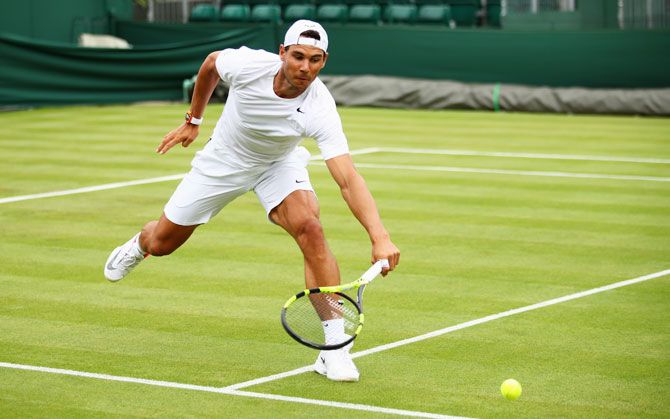Wimbledon's grass is slower than when Sampras and all the classic serve-volley specialists ruled the roost and, though it still offers a lower bounce than clay or the hard courts that dominate the circuit, it seems that the difference is becoming marginal.

When Pete Sampras ruled Wimbledon for a decade with serve-and-volley tennis where five shots constituted an epic rally, he could barely make the second week on the slow clay of the French Open -- different surface, different game.
At Wimbledon on Monday, Rafael Nadal, who had not played a competitive match on grass for two years, destroyed Australia's John Millman in straight sets by standing on the baseline and blasting out topspin ground strokes, just as he did to win the French Open a month ago.
Wimbledon's grass is slower than when Sampras and all the classic serve-volley specialists ruled the roost and, though it still offers a lower bounce than clay or the hard courts that dominate the circuit, it seems that the difference is becoming marginal.
"It would be nice if every surface has its own characteristics, and Wimbledon and grass courts should be faster," said German crowd favourite Dustin Brown after his first-round victory over Joao Sousa.
"I had the feeling that sometimes playing at the French Open might even be a little faster, just from the balls and the courts. It's a little sad because, personally, I think a lot of guys that are attacking and play serve-and-volley, like Feliciano Lopez or Gilles Muller, are all playing a lot less serve-and-volley. I think that's because everything is playing pretty slow."
Nadal dismissed the comments of the man who beat him in the second round on his last appearance at Wimbledon two years ago as "maybe not serious".
"It is obvious that (it) is (a) completely different sport," said the Spaniard after his 6-1, 6-3, 6-2 victory over Millman.
"It's a big change, I need to adjust my game. Of course, I can practise, but the only way to find your way on how to play well here is playing matches. I think I had good feelings with the ball during the whole week of practise on grass, but on grass you meet players that they can be very aggressive, and anything can happen."
Nadal has failed to get past the fourth round on his last four appearances at Wimbledon. But Sweden's Mats Wilander, who, like the Spaniard, won grand slam titles on grass, clay and hard court, thinks the difference is not so marked these days, and backed him to do well.
"The courts here are drying out really quickly, which will suit Rafa," Wilander told Reuters.
"I don't think these courts are necessarily playing much quicker (than hard courts), but they play lower. Rafa needs to hope he can avoid any real problems, any really big servers in the first week.
"If he can get through this first week, then he is every bit as much a favourite as Roger Federer."












